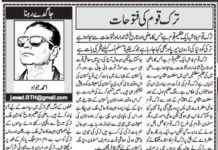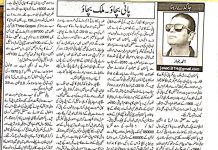Mechanism devised for overseas voting
Article Source: https://tribune.com.pk/story/1353583/mechanism-devised-overseas-voting/
By Irfan Ghauri
In a significant development, millions of Pakistanis living abroad might see their dream of casting ballots in the country come true, as a mechanism has been devised to grant them the right of vote in the next general elections.
A parliamentary panel has submitted its report to the Parliamentary Committee on Electoral Reforms with detailed procedure to ensure that over seven million Pakistanis living abroad get the right of franchise for the first time.
The mechanism proposed by a sub-committee headed by PTI MNA Dr Arif Alvi is devised into two components – registration of overseas Pakistanis as voters, and the procedure of casting vote through computer or a smartphone.
The National Database and Registration Authority (Nadra) would play a key role in the process along with the Election Commission of Pakistan (ECP).
The panel recommended that overseas Pakistanis who have attained the age of 18, possess the National Identity Card for Overseas Pakistanis (Nicop) and Pakistani passports should be registered as voters in a voter list prepared separately to be tagged as “electoral roll of overseas voters”. According to the Nadra record, there are around eight million eligible Pakistani voters living outside the country having Nicop. Around seven million of them have Pakistani passports as well.
Voter Registration
In the proposed method for registration of overseas Pakistanis as voters, Nadra would develop a specialised website for “electoral roll of overseas voters”.
Pakistanis living abroad would be asked to submit particulars of their Nicop and their Pakistani passports.
Once the Nadra’s website receives those particulars, the computer may generate some confirmation questions like mother’s name, etc., which is not printed in their Nicop but is available in the Nadra’s record.
This confirmation may also be done through a call centre to ensure a genuine person is getting his or her name registered and someone else not impersonating them.
Those registered in the electoral roll of overseas voters would also have their name printed in normal electoral rolls as well, but marked in a different colour like red or grey.
The panel proposed that this process maybe completed in a year or so.
Casting of vote
The sub-panel proposed that on the voting day in Pakistan, those registered as “overseas voters” should be allowed to cast their vote either in 24 hours preceding the election day or in the 24 hours ending at 5pm on the election day, depending on the ECP’s convenience.
A person registered as an overseas voter shall be sent a code in a message on his computer or smartphone that he/she would use to go on to the Nadra/ECP website to cast his/her vote.
In the website, the voter would see choices of candidates for his/her constituency like voters in Pakistan see on a printed ballot paper. The only difference will be those voters will cast their vote electronically on the website.
Those votes shall be counted by the ECP and results will be communicated to the returning officer of each constituency. The same result shall be posted immediately to the ECP’s main election results website.
The committee recommended that to ensure security of data, Nadra should develop back-end software and hardware if needed.
The panel believes that Software Required Specifications (SRS) can be developed within one month. Once the SRS is finalised, the cost of software development and estimate of hardware needed will be finalised.
The committee recommended that the ECP should have final control of the voting process with Nadra acting to provide background facilities.
Vote audit
A vote audit process would also be available in case the matter is challenged by any candidate. The “keys to un-enrypt” the process should lie with the Chief Election Commissioner who can use it if needed a vote audit.
According to Dr Alvi, after a series of briefings with Nadra officials, the committee believes the mechanism proposed by his panel, is very secure. The estimated cost of software, hardware and back-end management would not exceed $1.5 million only.
However, Dr Alvi in his conversation with The Express Tribune appeared sceptical if the government would go for it.







